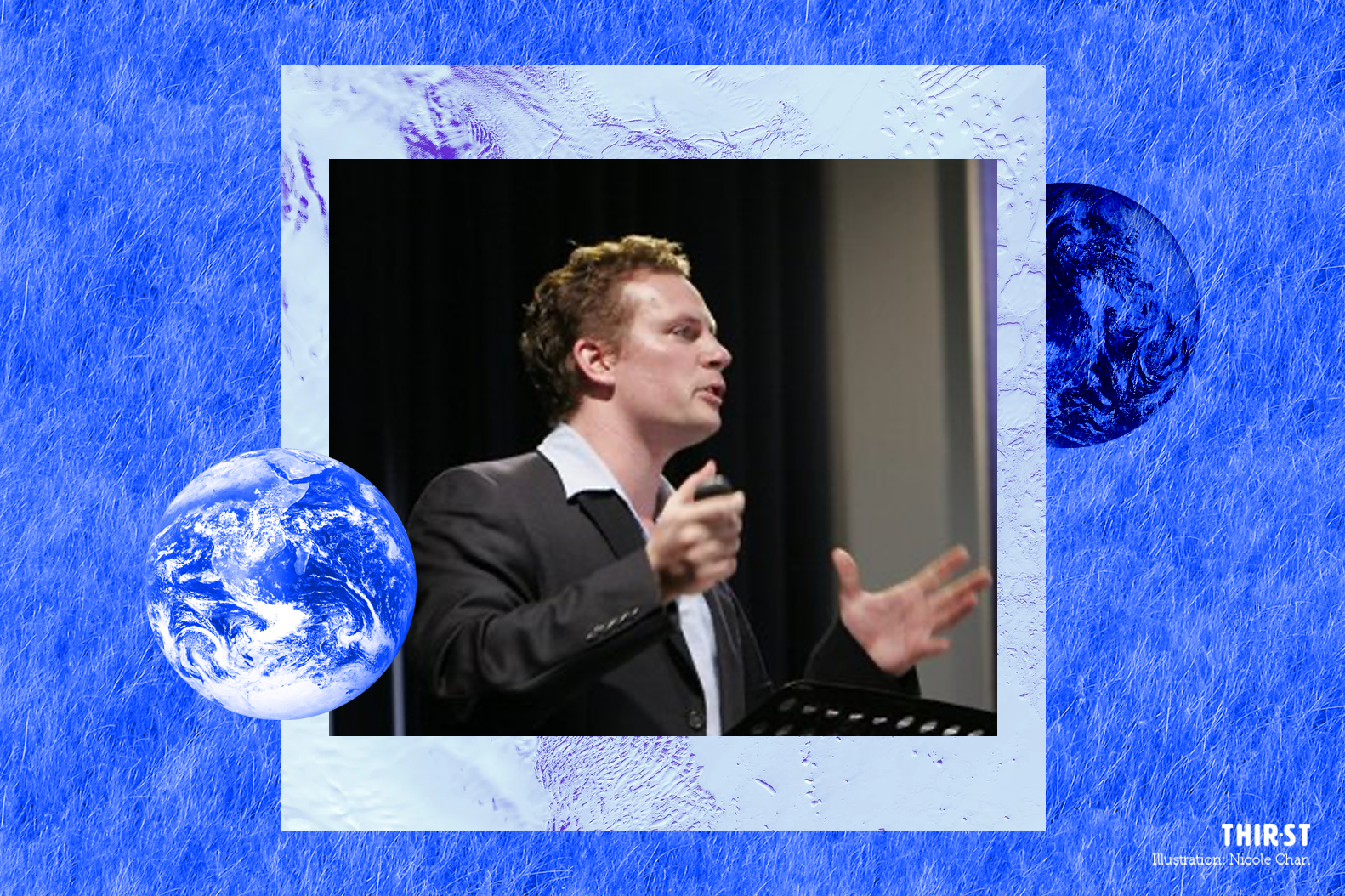In the midst of all the chaos that was the past two years, it’s easy to miss the forest for the trees.
Dare we ask: what’s the bigger picture, the grander narrative, God’s Kingdom plan in light of the changes that COVID-19 has wrought upon the world?
Thankfully, the recent 60th anniversary conference of the Evangelical Free Church of Singapore (EFCS) invited just the right guy to answer these questions.
Meet Jason Mandryk, one of the co-authors of Operation World which is seen by many as the definitive global prayer handbook. I’ll let this review of the hardcover edition speak for itself:
“This is probably one of the most important missionary tools in the entire history of missions.” – George Verwer, founder of Operation Mobilisation
Got your attention? To top it all off, his Amazon bio states that he listens to progressive rock music. My man.
So if you’re looking for a bird’s eye view of where the Church stands in relation to global trends, I think it’s safe to say that Jason Mandryk’s reflections would be a decent place to start.
Before Mandryk delved into what he considers to be the seven macro-trends that have emerged or accelerated due to COVID-19, he noted that we’ve actually been here before.
“When we look at church history, we can see that littered across the last 2,000 years, plagues have very often catalysed and then ushered in great and rapid changes in our world,” he began.
Mandryk shared that it is thus “good to know that the Church is where it is today in spite of — and perhaps even thanks to — pandemics.”
His encouragement was that while some of the global shifts might make for grim reading, it would be good to hold on to Jesus’ words about His church in Matthew 16:18: “And the gates of Hades will not overcome it.”
THE SEVEN GLOBAL SHIFTS
Shift #1: The Epistemological Crisis
Epistemology is a fancy way of saying “how we know what we know”. What is the nature of truth? Who determines what is true?
While we’ve lived in a postmodern world for quite a while now, Mandryk noted that COVID-19 has further eroded much of the world’s ties to objectivity by driving people further into online echo chambers.
In other words, truth is often determined by which WhatsApp/Facebook/Telegram/WeChat group one finds themselves in.
“We now face the challenge of internet echo chambers, deepfakes, platform-specific curated propaganda, the use of social media to spread conspiracy theories and its infiltration by trolls and shills,” warned Mandryk.
These all pose novel problems for Christians sharing the gospel.

Mandryk continued: “How do we (as Christians) assert to other people that we have truth and others do not? Are we still able to appeal to the notion of truth to objective matters of right and wrong? To facts that have moral and not merely statistical implications?
“Or have we been reduced to a gladiatorial arena where whoever has the most convincing or compelling narrative wins the battle?”
While many of these challenges wrought by technology are new, what isn’t new is the question of what is truth.
Mandryk ended off this section with a sobering reminder that Christians have a very radical definition of truth — truth is not just a concept but a Person.
Shift #2: The Economic Crisis
Mandryk believes we are currently witnessing the decline of the world’s economic superpower in the US, which has serious implications for global missions.
Noting that “a Western economic hegemony usually brought about access, protection and privilege for Western missionaries serving outside of Europe and North America”, Mandryk predicts a rapid decline of Western missionaries due to an erosion of “protection and privilege”.
As such, the burden of missions will begin to weigh heavier upon the Church in Asia and Africa, or what is commonly known as the “global south”.
Additionally, given that “much of our theology and ways of doing church is rooted in the West”, Mandryk asserted that the need to develop and be proud of native (and non-Western) yet Biblical expressions of faith, missions and theology is ever more urgent.
The K-shaped recovery from COVID-19 has also further widened the gap between the both the rich and the poor within nations, and between rich and poor nations themselves.
We have to find economic models that are just and that are sustainable for a planet of 8 billion plus people.
“We are uncovering only now the hidden costs of the economic models that we’ve been working with in the last few centuries,” reflected Mandryk. “Our runaway consumption as a human race has had us borrowing from the future in order to pay for our present indulgences and excesses.
“We have to find economic models that are just and that are sustainable for a planet of 8 billion plus people. Because it’s increasingly evident that the systems that enriched some of humanity for the last 300 years, including the Golden Age of missions — these models have been significantly predicated on injustice and on exploitation and on unsustainability.”
- What are the responsibilities of Jesus followers in today’s economic context?
- How do we compassionately minister to the poor and address systemic injustice?
- How do we continue to finance the Great Commission?
In the face of economic crisis and change, questions like these are ones that Mandryk believes are pertinent for the Church to ask.
He also believes it is time for Christians and missionaries from the “global south” of the world’s economy — traditionally labelled as third-world or developing nations — to take the lead in doing missions.
That is because their lack of association with colonialism and more modern forms of economic exploitation (like debt-trap diplomacy) will undoubtedly come into play when considering missions initiatives to less-reached countries in Africa, the Middle-East and Southeast Asia.
Shift #3: The Environmental Crisis
- Increasing consumption, increasing world population
- Pollution
- Ubiquity of microplastics all around the world
- Hormones in water
- Increasing methane in the atmosphere
“The list goes on,” remarked Mandryk grimly — and it doesn’t get better.
Mandryk shared that many scientists believe the world is witnessing its “sixth great extinction” in the history of the planet given the massive die-offs of many diverse species today.
“The rapid reduction of animal biomass means really bad news for our environment,” noted Mandryk. “And for our own prospects as a human species.”
Thankfully, it’s not all doom and gloom. Mandryk suggested that it’s time for Christians to lead the way in tackling climate change: “Wouldn’t it be great if Christians could be at the forefront of (green) technological revolutions that benefit humanity?
“Wouldn’t this beautifully reflect God’s mandate to care for the garden in which he placed humanity?”
As I listened to Mandryk, I couldn’t help but think of Singapore’s push to become a “City in a Garden“.
While our carbon footprint is miniscule on a global scale, the government hopes that Singapore can be a country that demonstrates to the region and to the world what sustainable living, being in harmony with nature, can look like.
I think that’s something commendable and worth supporting.
Now, as many churches in Singapore are looking to redevelop their premises in light of having to extend their land leases, wouldn’t it be an awesome testimony if our new premises were “green” premises?
I also think it would be a great testimony if Christians radically led the way in ditching our cars in favour of public transport or cycle-commuting.
Shift #4: The Ethical Crisis
- What is good, what is evil?
- Who decides on matters of private and public morality?
- Who decides on matters of faith? Politics? Sexuality? Sanctity of life?
These were the kinds of questions that Jason opened this section with. In truth, the ethical crisis ties in with the epistemological crisis.
As Christians, we believe we’ve always had God’s truth on our side. But Mandryk suggests that our credibility in this area has taken a hit in recent times.

“The biggest problem is not how complex or difficult these issues are to navigate, but rather that we have surrendered any moral high ground because of our own conduct,” asserted Mandryk.
Indeed, examples of church leaders or prominent believers failing to “demonstrate integrity, accountability or transparency” are sadly not hard to find in recent times.
“Until Christians can be seen by the world to practice what they preach, why would anyone listen to us?” Mandryk mused. “Why would our opinions or our convictions have any weight with the unbelieving world?
“Christians have to lead by example, rather than by leading from a soapbox.”
Shift #5: The Evangelical Crisis
Picking up from the previous section, Mandryk went on to talk about how the term “evangelical” has become a very misused word.
“The reality today is that Evangelical Christians are overwhelmingly from Africa, Asia and Latin America,” he said. “They’re mostly younger rather than older. They’re far more female than male in population. And there are more poor than rich amongst global evangelicals.”
“And yet this word has become associated with the opposite in all of these cases,” Mandryk reflected.
The question on Mandryk’s heart is this: When will the voices of Evangelicals be proportionate to the places where dynamism and growth are most profound?
Beyond this, Mandryk also shared that the Church faces the challenge of prosperity theology impacting and infiltrating evangelicalism.
Shift #6: The Ecclesiological Crisis
In other words, the shift in how our churches are structured.
The pandemic has forced many churches to change the way they run programs and organise themselves. While we all hope for things to get back to the way they were, the world has changed for good.
“We may bemoan the seeming extinction of what we assumed the church to be, but really that church was just based on a European model of church structures from four or 500 years ago,” reflected Mandryk.
Mandryk’s encouragement, however, is that “we have many more models of doing church that will be of much greater utility in the years ahead”.
“The church was effective for centuries before Luther and Calvin and John Knox and Pope Paul III and all the others did their bits during that tumultuous time (around the Protestant Reformation) that gave us the model of church we predominantly have today,” noted Mandryk.
“But there have been many other more effective ways before that time.”
So instead of seeing changes as a problem, Mandryk urged believers to acknowledge and be pleasantly surprised that we now have so many more options about how to follow Jesus together than we thought we had.
- Digital church
- More small group meetings, less large-scale gatherings
- Giving cell-group leaders more autonomy in how their groups are run
- Pastors focusing on training and equipping other leaders rather than doing all the work themselves
These are just some of the shifts we’ve seen during the pandemic, and I suspect that many of them are here to stay. God willing, they may well turn out to be positive changes for the health of churches.
Shift #7: The Missiological Crisis
Finally, Mandryk said that the Church must come to terms with the fact that the world’s population growth is outpacing evangelism efforts to the tune of “60,000 people daily”.
“We are sharing less to the unevangelised population, those who haven’t been reached with or don’t have meaningful access to the good news,” lamented Mandryk, who is currently serving in Singapore with Operation Mobilisation.
“This number increases every day by over 60,000 people. This is mostly because we are not reaching people with the good news nearly as quickly as they are reproducing and increasing in number.”
- What do we believe Jesus commanded His disciples to do and what do we believe about the implications for us?
- What do we believe about those who don’t hear the good news in their lifetimes?
Raising important questions like these, Mandryk shared that our answers to them will have a huge impact on our “ministry priorities” and “personal lifestyle choices”.
WHERE DO WE GO FROM HERE?
My personal takeaway? Missions, moving forward, will be more about being rather than doing.
After all, God’s own model of missions is incarnational: He lived among us and suffered among us.
The world (Western, first-world) may be becoming more hostile to what it thinks the gospel is, but that gives us a new opportunity to live out the gospel by meeting the needs of nations and communities on the wrong end of these global shifts.
Even as borders remain closed, I think we have a great opportunity to reflect on these shifts and start practising and experimenting with solutions.
For example, how can we practice racial and economic inclusion in our churches? Or live more eco-friendly lives?
I am reminded once again that being a Singaporean really affords me with financial resources and access to regions that have closed themselves up to Western missionaries.
Perhaps, during this season of restricted travel, God is calling me to quieten my heart before Him and listen in preparation for what He has in store next.
Maybe He’s calling you to do the same, too.
- What is one key takeaway from your reading of this article?
- How does it challenge some of the burdens on your heart or the struggles you are going through?
- Meditate on Matthew 28:16-20.
- Ask the Lord what your part to play in the Great Commission looks like.









